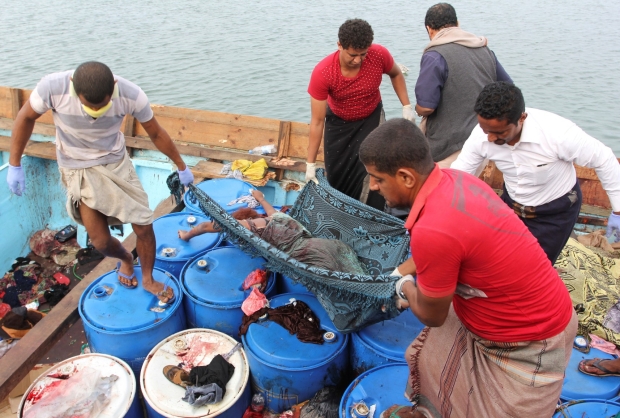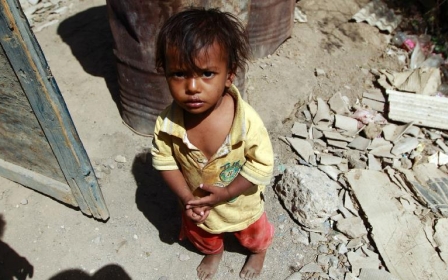Somali refugees killed off Yemen as Apache helicopter attacks boat
Forty-two Somali refugees were killed off the coast of Yemen late on Thursday, when a helicopter attacked the boat they were travelling in, a local coast guard in the Houthi-controlled Hudaida area said.
Coast guard Mohamed al-Alay told Reuters that the refugees, who were carrying official UNHCR documents, were on their way from Yemen to Sudan when they were attacked by an Apache helicopter near the Bab al-Mandeb strait.
A sailor who had been operating the boat, Ibrahim Ali Zeyad, said 80 refugees were rescued after the incident.
The International Organisation for Migration said the death toll could rise, with "dozens of deaths" so far and 24 survivors in an extremely critical condition in hospital.
There were reports that some people who survived the attack then jumped from the boat into the water.
Photos from the scene showed bodies of men, women and children laid out on the ground at a small harbour, covered in pieces of coloured fabric.
Local news reports said the boat was hit by Apache helicopters.
Little is known about the boat's destination, although the passengers may have been fleeing intensifying military operations in Yemen for the relative safety of Sudan.
It was not immediately clear who carried out the attack, although the Saudi-led coalition is known to fly Apache helicopters near the strategic Bab al-Mandeb strait, which connects the Red Sea to the Gulf of Aden and carries millions of barrels of oil per day.
Local news site Aden al-Ghad reported that jets from the Saudi-led coalition - which has led a ground and air campaign against Houthi rebels since March 2015 - had "intensified its strikes" in Hudaida on Thursday.
"Coalition planes launched dozens of strikes on coastal areas of Hudaida, in support of advances by troops on the ground," a local source told the site, which is known to be opposed to the Houthi rebels.
However, a spokesperson for the Saudi-led coalition denied that its forces had been active in the Hudaida area on Thursday.
General Ahmed al-Asseri said Hudaida remained under the control of the Houthis, and the port continued to be used for "trafficking people, smuggling weapons and attacks against the line of communications in the Red Sea."
The UN said it was "appalled" by the attack and was supporting survivors, saying that refugees in the country were being forced to move further north as a result of the deteriorating situation.
The UN says there are currently over 250,000 refugees from Somalia in war-torn Yemen, as well as over 2.5 million Yemenis who have been displaced by the fighting and earlier conflicts.
"Despite conditions in Yemen not being conducive for asylum owing to the on-going war, Yemen continues to be a destination country for new arrivals from Somalia and a transit country for many asylum-seekers and migrants," the local branch of UNHCR said in a recent report.
Somalia, which lies just across the Gulf of Aden from Yemen, is currently in the grip of a devastating famine that has left half of the country's population - over six million people - in need of urgent humanitarian assistance.
Around a million children under the age of five will be "acutely malnourished" this year, the UN has said.
However, Yemen is also now on the brink of famine itself as a result of the conflict, which has devastated vital infrastructure in a country that was already the poorest in the region.
The chaos has so far led thousands of Yemenis to flee across the Gulf of Aden to the Horn of Africa, including thousands who made their way to northern Somalia.
In a separate attack, eight Yemeni fisherman were reportedly killed on Thursday when their boat was hit off the coast of the north of Hudaida province.
Middle East Eye propose une couverture et une analyse indépendantes et incomparables du Moyen-Orient, de l’Afrique du Nord et d’autres régions du monde. Pour en savoir plus sur la reprise de ce contenu et les frais qui s’appliquent, veuillez remplir ce formulaire [en anglais]. Pour en savoir plus sur MEE, cliquez ici [en anglais].





